Carter G. Woodson established Negro History week in 1926 to preserve the history of African Americans and ensure their contributions are recognized and celebrated. Since landing on the shores of North America, African Americans have resisted oppression and fought for dignity, justice and self-determination. Join us in
celebrating black artists, freedom fighters, religious leaders, lawmakers, athletes, educators and others who have used their talents and expertise to escalate and illuminate the fight against prejudice and discrimination.
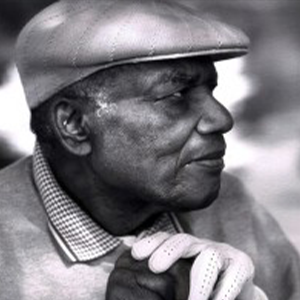
William James “Bill” Powell
First African American to design, construct, and own a professional golf course in the United States
Bill Powell was born in 1922, and worked as a golf caddy in Minerva, Ohio as a youth. After high school, he played golf at Wilberforce University before serving with the U.S. Army Air Forces in World War II. When he returned home from thew war, segregationist policies prevented him from golfing on public courses, so he decided to build his own. Although denied a G.I. loan, with financial support from his brother and two African American physicians, Bill bought a dairy farm outside East Canton so he could open a course that would welcome players of all races.
Powell and his wife physically moved boulders, pulled up fence posts, and seeded cow pastures to create the Clearview Golf Club, a nine-hole course that was used by thousands of people each year. In 1996, Powell was inducted into the National Black Golf Hall of Fame, and in 2001, Clearview was designated a National Historic Site. Bill’s daughter Renee is Clearview’s Head Golf Pro and the second African American woman to play for the LPGA. In 1992, the Powells received the Jack Nicklaus Golf Family of the Year Award from the National Golf Foundation.
In 2009, upon receiving the PGA’s Distinguished Service Award, Bill explained, “I did not want other people who wanted to play the game of golf to have to suffer the indignities that I had.”
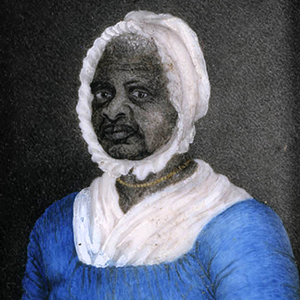
Elizabeth “Mum Bett” Freeman
Berkshire County Early Civil Rights Pioneer
All men are born free and equal, and have certain natural, essential, and unalienable rights; among which may be reckoned the right of enjoying and defending their lives and liberties; that of acquiring possessing, and protecting property; in fine, that of seeking and obtaining their safety and happiness
Massachusetts Constitution, Article 1.
Inspired by the words of the Massachusetts constitution, Bett Freeman, enslaved by a Sheffield, MA landowner, sought counsel and sued for freedom in court. Her case was heard in August 1781 before the County Court of Common Pleas in Great Barrington. Her attorneys asserted that the constitutional provision that “all men are born free and equal” effectively abolished slavery in the state. The jury ruled in Bett’s favor, and she became the first African-American woman to be set free under the Massachusetts state constitution. Her case set the legal precedent that ended slavery in Massachusetts.
“Any time while I was a slave, if one minute’s freedom had been offered to me, and
I had been told I must die at the end of that minute, I would have taken it, just
to stand one minute on God’s earth a free woman, I would.”
-Elizabeth Freeman
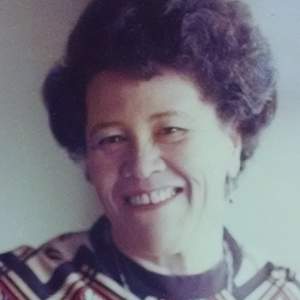
Margaret Cunningham
Founder, Hamilton Hill Arts Center, Schenectady, NY
Margaret Cunningham grew up in Brooklyn and attended Hampton University, Howard University, and SUNY Albany. In 1942, she married Dr. James Cunningham, the Capital District’s first African American psychiatrist. A resident of Schenectady, Margaret recognized the lack of afterschool programs for children of color in the struggling, underserved Hamilton Hill neighborhood, and in 1968 founded the Hamilton Hill Arts Center. The center still thrives as a safe, drop-in space accessible to the community. Children celebrate the culture of the African diaspora through both African and African American art forms, visiting artists, and positive role models. Margaret Cunningham identified a gap in a primarily African American neighborhood and through action, created a safe and creative space for children of a community in need.
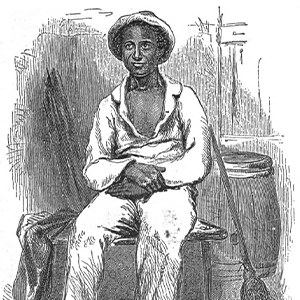
Solomon Northup
Author, 12 Years a Slave
Solomon Northup was born in Minerva, New York in 1802. As the child of a freed slave and a free woman of color, he was born free.
Married and living with his wife and children in Saratoga Springs, NY, Northup played the violin at several hotels. There he met two men who hired him for a fraudulent traveling music show that took him to Washington, DC, where he was kidnapped and sold into slavery for 12 years. Eventually saved by a white family that had once enslaved his father, Northup authored a memoir about his experience, with the intention to expose his kidnappers, and shed light on his terrifying years as an enslaved man. He traveled the Northeast, lecturing on abolitionism and his experience. His book, 12 Years a Slave, was a bestseller and propelled the anti-slavery movement in the pre-Civil War era. The award-winning 2013 film adaptation is still used today to educate about the horrors of slavery.
Saratoga started celebrating “Solomon Northup Day” in 2002 to honor his legacy. It is celebrated on the third Saturday in July each year.
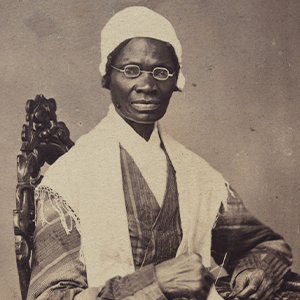
Sojourner Truth
American Abolitionist and a Women’s Rights Activist.
Sojourner Truth was born into slavery as Isabella Baumfree in Ulster County, NY. Bought and sold many times, beaten and sexually assaulted, by the age of thirteen, she was settled at the home of John Dumont in West Park, NY. There, she was forced to marry an enslaved man, and gave birth to five children.
One year before the New York Anti-Slavery Law emancipating enslaved people took effect, Isabella escaped with one of her children and settled with a family who later bought her freedom from Dumont. After learning that he had sold one of her sons illegally, she sued Dumont for his return, and became the first black woman to sue a white man and win.
In 1843, as a reflection of her Christianity and desire to speak the truth, Isabella changed her name to Sojourner Truth, and embarked on a journey to preach the gospel and speak out against slavery and oppression. She dedicated the rest of her life to fighting for equality for African Americans, helping many slaves escape to freedom, recruiting black troops for the Union Army during the Civil War, petitioning the government to resettle formerly enslaved people on government land, and finding jobs for freed Black Americans fighting poverty.
In 2022, Gov. Kathy Hochul dedicated Sojourner Truth State Park near her birthplace in Kingston, NY.
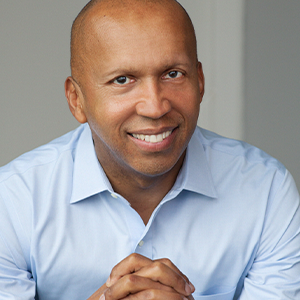
Bryan Stevenson
American Lawyer and Social Justice Activist
Born in 1959, Bryan Stevenson was part of the first generation of African Americans in Delaware to experience legalized integration in public schools. After graduating, he enrolled at Harvard University where he discovered his passion for establishing equal legal representation.
Stevenson established the Equal Justice Initiative (EJI) in 1994, guaranteeing legal representation to death row inmates in Alabama. He was specifically effective at reducing harsh penalties that had been imposed on children under the age of 18 who had been convicted of crimes. His opposition was so successful, that the Supreme Court agreed with the EJI in the landmark Roper vs. Simmons case, finding it unconstitutional to give children life sentences.
In 2014, Stevenson wrote the memoir Just Mercy: A Story of Justice and Redemption, detailing his career and the inequalities of the US judicial system. The NY Times selected it as one of the “100 Notable Books” of 2014. A film based on the book premiered in 2019. To this day he is an active public speaker and continues to bring awareness to racial injustice and the history behind it.
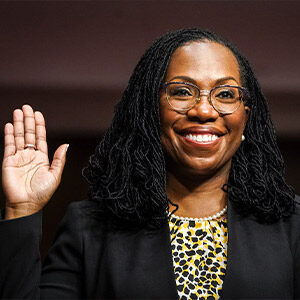
Ketanji Brown Jackson
Associate Justice, United States Supreme Court
Born in Washington, DC, and raised in Miami, Florida, Ketanji Brown Jackson traces her love of the law to her preschool days, sitting next to her father as he tackled his law school homework and she worked on hers—coloring books. Despite standing out as a high achiever throughout childhood, like many Black women, Ketanji faced naysayers. When she told her high school guidance counselor she wanted to attend Harvard, she was warned not to set her “sights so high.” Nevertheless, Jackson graduated magna cum laude from Harvard University, then cum laude from Harvard Law School, and was an editor of the Harvard Law Review.
Jackson’s path to US Supreme Court Justice began as a law clerk to Supreme Court Justice Stephen G. Breyer, where she learned the importance of building consensus and speaking to a mainstream understanding of the Constitution. From there, she served as a public defender and would become the first former federal public
defender to serve on the US Supreme Court.
In 2010, Jackson was confirmed as Vice Chair of the US Sentencing Commission; in 2013, as a judge for the
US District Court for the District of Columbia; in 2021, to the US Court of Appeals for the D.C. Circuit, and in April 2022 as the 116th Associate Justice of the US Supreme Court. She was sworn in on June 30, 2022, becoming the first Black woman to serve as a justice in the 232-year history of the Court.
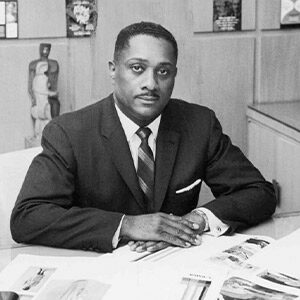
John H. Johnson
Founder of Johnson Publishing Co.
John H. Johnson was born into poverty in Arkansas in 1918, migrated to Chicago during the Great Depression, and built the world’s largest Black-owned publishing company. In 1942 he started Negro Digest, modeled after Reader’s Digest with a $500 loan. Ebony, a glossy pictorial magazine similar to Life, followed in 1945 and included the first national-brand advertisements to use Black models. Jet magazine, introduced in 1951, included seminal coverage of the murder of Emmett Till, a rallying event in the Civil Rights Movement.
“We wanted to give Blacks a new sense of somebodiness, a new sense of self-respect,” said Johnson in 1975. He convinced major companies to advertise in Black magazines, published books on Black history, started a cosmetics line, and founded Chicago’s first Black-owned radio station. His work transformed how AfricanAmericans viewed themselves. Recognized with numerous honors and awards, Johnson received the Presidential Medal of Freedom in 1996.




